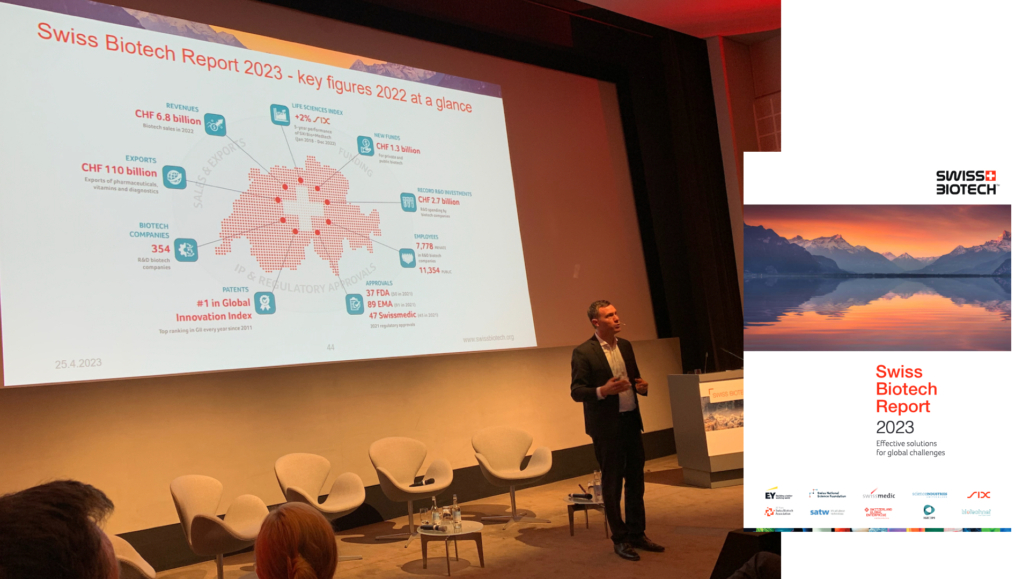
Swiss Biotech Report: Sunrise, not sunset, is the feeling of the hour
In 2022, the Swiss biotech industry "continued to demonstrate its resilience, adapting well to geopolitical upheavals and remaining a key driver of innovation for global healthcare". Swiss biotech companies generated revenues of CHF 6.8bn. Capital inflows amounted to more than CHF 1.3bn, of which CHF 780m went to listed companies and CHF 550m to private companies. These are some of the findings of the annual industry report published by the Swiss Biotech Association in collaboration with EY and presented at Swiss Biotech Day in Basel.
The latest Swiss Biotech Report, published at the end of April by the Swiss Biotech Association (SBA) in collaboration with EY and eight other partner organisations, shows that the Swiss biotech industry was robust last year and remains an important driver of innovation for the global healthcare system. Companies generated revenues of CHF 6.8bn. Capital inflows amounted to more than CHF 1.3bn, of which approximately CHF 780m went to listed companies and CHF 550m to private companies. Investment in research and development continued to grow, reaching a new high of CHF 2.7bn. "The record high of over 2.7bn Swiss francs spent on research and development shows that Swiss biotech companies continued to invest heavily despite global uncertainties and an overall more difficult financing environment. Although global investors were more selective than during the Covid pandemic, Swiss biotechs received more than 1.3bn Swiss francs in capital. This shows that Swiss and international biotech investors continue to recognise the attractiveness of the industry," said Michael Altorfer, CEO of the Swiss Biotech Association, at the presentation of the annual industry report.
Alongside some examples of great successes, but also some downturns in the development of companies, the association points out that more than 95% of Swiss biotech companies are private companies, many of them small, and yet they generated another record turnover of CHF 6.8bn in 2022, up from CHF 6.7bn in 2021. But a look at sales alone would not be complete without a look at the profit and loss account: Here the Swiss biotech scene remains in the red at around CHF -1.4bn due to high investments. On the positive side, however, the investments are geared to the future, and the continued high liquidity resulting from the many billions in financing in recent years ensures a high level of stability, according to Frederik Schmachtenberg, EY, one of the authors of the report. Among the privately financed biotech companies that raised a total of CHF 550m in new capital, CDR-Life and ImmunOS Therapeutics accounted for the largest share, with financing rounds of more than CHF 70m each. According to Altorfer, it is also encouraging that a clear upward trend is already emerging in the first months of the new year, as shown by the remarkable financing rounds of Noema and Alentis (over CHF 100m each).
The Swiss Biotech Day, this year attended by record numbers of 1.800 international participants, and the industry report presented at the event are always used to promote Switzerland as a business location. The arguments seem to be working, as 20% of European biotech companies had their headquarters in Switzerland by the end of 2002. According to the SBA, they cited the central location, the modern infrastructure, the business-friendly environment and the excellent skilled workforce as decisive factors in their choice of location. Start-ups may also be helped by the fact that Switzerland is considered a model country for technology transfer and that there is now some movement in the world of public authorities: In 2022, for example, the Swiss regulatory authority Swissmedic set up the Innovation Office. The new institution is intended to speed up the development of innovative medicines.



 adobe.stock.com - ipopba
adobe.stock.com - ipopba BioDlink
BioDlink